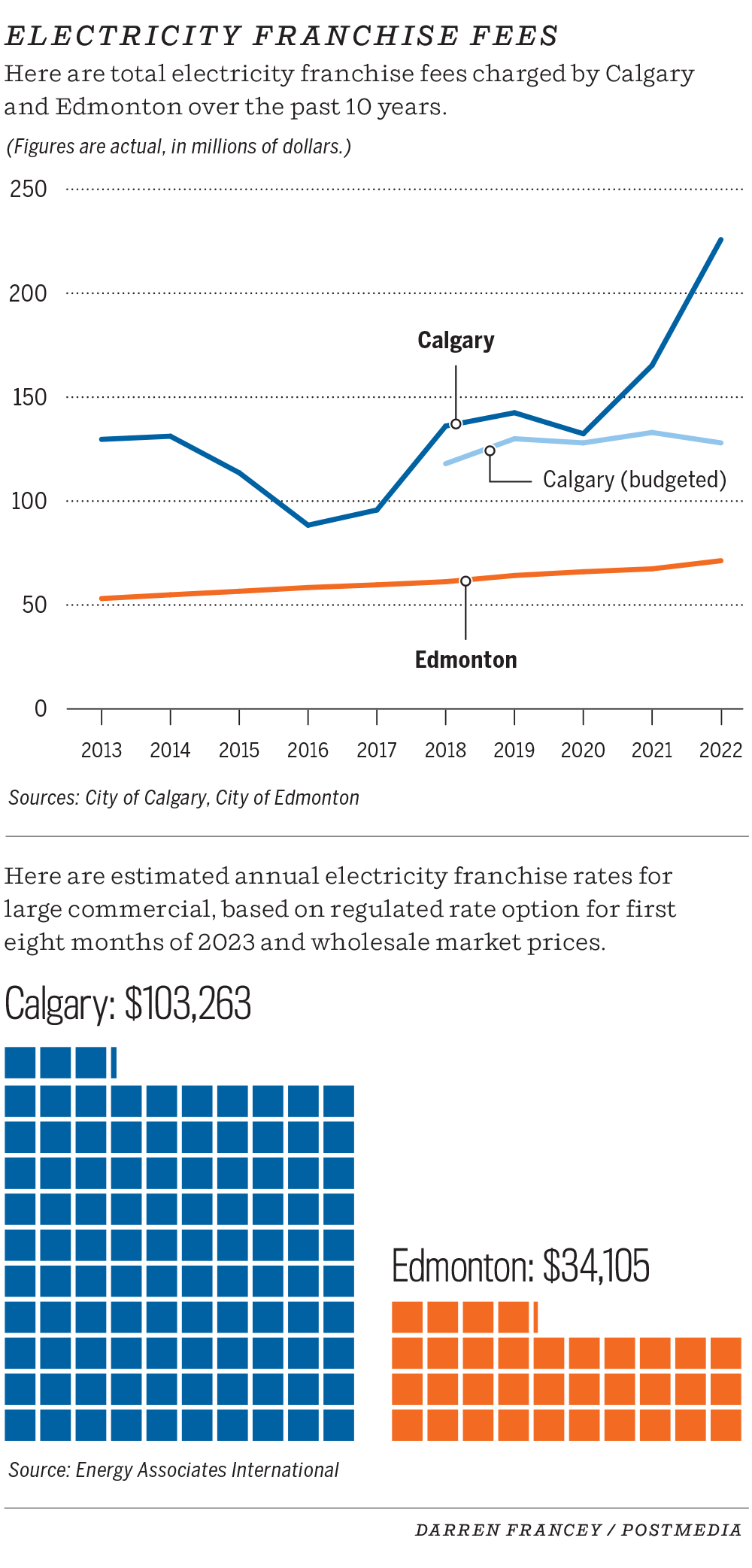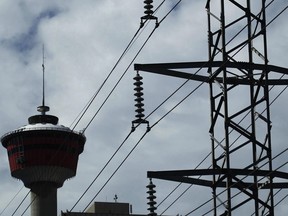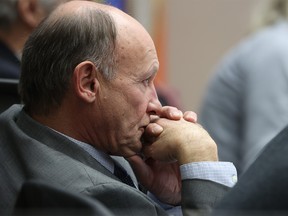
WinSport CEO Barry Heck knows the organization faces large utility bills each year to operate Canada Olympic Park.
That’s one reason the non-profit community organization takes steps to lock in its power prices and provide some budget certainty.
This year, all of its utility expenses are expected to reach about $3.5 million.
But as the default rate for electricity consumers in Alberta charges into record territory this month, a key part of power bills for WinSport — and all Calgary consumers — is going up, even those who aren’t on the regulated rate option (RRO).
The monthly franchise fees the city charges all electricity users — fees paid by a utility to a municipality in lieu of property taxes and other fees — is partially tied to the RRO rate.
And it’s been climbing.
For Heck, it means unbudgeted increases for WinSport, even though it’s not on the default rate.
“That portion of our fee or utility cost is just going through the roof and it’s impossible for us to control,” he said in an interview this week.
“Over $400,000 of that (part of the bill) is going to be just this one component of the cost pile. So, it’s just one more challenge that WinSport has to try and budget around.”
The RRO, the default power rate for residential, farm and small business consumers who haven’t signed a fixed-price contract with a competitive retailer, fluctuates each month.
It has soared to 31.86 cents per kilowatt-hour (kWh) in the city for August. That’s an all-time high, up from 27.57 cents charged last month.
Those rates have spiralled up over the past two years, along with wholesale Alberta Power Pool prices.
Last year, the RRO gyrated from 9.97 cents per kWh in May to 22.1 cents in December.

While the majority of Calgarians have signed contracts with competitive retailers, they are affected by the monthly franchise fees charged by the city.
(Provincial legislation permits municipalities to levy a fee in lieu of property taxes and right-of-way access fees on utilities. In Calgary, the franchise fee has two components, the cost of distribution infrastructure to deliver the energy to customers and the value of power used — based upon the RRO price.)
When the default rate goes up, so does the municipal fee, which is collected by Enmax and passed along to city hall.
Experts say it’s leading to a bonanza of revenue for city coffers, but increasing costs for Calgarians.
“Quite simply, Calgary’s local access fees for residential, commercial and large industrial users are far more costly than any other municipality in the province,” Thomas Glenwright, senior director at consultancy Energy Associates International, said Wednesday.
“From 2018 to present, the local access fee charges for an average homeowner have increased by more than two-and-a-half times.”

Based on the RRO for the first eight months of 2023 and estimates for the rest of the year, he calculates the average cost for a homeowner will be $261 this year, compared with $140 in Lethbridge, $79 in Edmonton and $78 in Red Deer.
For a large commercial user, the annual bill would exceed $100,000 in Calgary, compared with $34,000 in Edmonton and Lethbridge, and $24,000 in Red Deer.
WinSport paid $160,000 in 2020 for franchise fees, a figure that shot up to $333,000 last year.
In the first six months of this year, it paid just under $200,000 and Heck anticipates the number will reach $400,000 by year’s end.
“We’ve got to work with the city and come up with a different method,” he said.
The franchise fees are generating plenty of extra money for the city.
According to city data, local access fees for electricity came in slightly above their own budget estimates in 2020, generating an extra $4.4 million.
In 2021, the actual revenue received from these electricity franchise fees increased to $165.3 million, or $32 million above budget.
However, as power prices and the RRO headed higher last year, the total collected jumped to $225.8 million, nearly $98 million over budget estimates.
Energy consultant Sheldon Fulton, who has studied the issue, believes the city will see another windfall this year.
He noted Calgary received $91 million in such payments from Enmax in the first quarter, and estimates the city is on track to collect more than $315 million this year.
“At some juncture, what needs to happen is someone at city council needs to take notice of this — and so does the province,” said Fulton.
“Unless they change the RRO rate, or unless the City of Calgary changes its formula for collecting its local access fee, this one is not going away. We are going to continue to see excess collections of payments, way beyond what they’re budgeting.”
However, Oyin Shyllon, Calgary’s manager of corporate economics, said the city budgets conservatively for its expected franchise fees.
Recommended from Editorial
-

Calgary prepares for energy rates to hit record high on Tuesday
-

Enmax delivers $82-million dividend to Calgary
-

Councillors look to possible utility relief as Calgary nets extra $47M on energy bills
The city doesn’t set the RRO — that’s regulated by the Alberta Utilities Commission — and criticism that Calgary’s fees are too high is unfair, he said, pointing out that Edmonton collects more in natural gas franchise fees.
(Last year, Calgary received about $6.7-million less in gas fees than Edmonton, the city’s data indicates.)
“When you look at the utility franchise fee regime, you have to look at it across all utilities, you have to look at electricity, natural gas and water-related utilities,” Shyllon said.
“Right now, we’re in focus because electricity prices are high.”
Any unbudgeted money collected from local access fees goes to help pay for other city services and capital items, noted Coun. Andre Chabot.
“A lot of our franchise revenue goes directly into our total revenue stream. And we typically under-project, and so if we collect more, then we don’t have to increase taxes as much,” said Chabot.
“Anything that is over and above what we projected goes into a reserve . . . for capital projects.”

The city’s use of the RRO for the franchise fees, however, maybe be coming to an end if the province moves forward with Premier Danielle Smith’s stated desire to replace the default rate.
It’s unclear where that would leave the city, Mayor Jyoti Gondek said in an interview.
Gondek noted the city’s franchise fee model was reviewed earlier this year by council during a closed-door session.
“At the time, the recommendation that we came back with is that we keep things status quo . . . but as the market is getting more volatile, I imagine we’ll be having more conversations,” she said.
“Stay tuned. I don’t think this is something that’s going away . . . It’s definitely on our radar.”
Business groups have also been concerned with the issue as power costs have gone up, right across the province.
A survey of business operators by the Alberta Chambers of Commerce taken in May and June found 78 per cent are concerned about the cost of electricity.
In a similar survey conducted last November, 36 per cent of business operators in the province cited municipal franchise fees as something that negatively affects their growth or competitiveness.
“It’s such a major, major issue and we’re hearing it on all fronts,” said Jason Leslie, chief operating officer of the Alberta Chambers of Commerce.
In Calgary, Ruhee Ismail-Teja, director of policy for the Calgary Chamber of Commerce, said the group connected with the mayor’s office last week and relayed its issues with the local rates.
“We are quite concerned about the volatility of franchise fees,” she said.
“Given the rising cost environment, it’s quite challenging for business to be hit with both the high cost of power, and then an additional fee.”
With the province looking at the future of the RRO, it’s an opportunity for the city to “look at what makes sense on a municipal level” and examine how other communities apply the fee, she added.
Edmonton doesn’t base its franchise fee for power on the RRO rate.
Heck is looking for certainty as WinSport tries to manage its finances. He hopes to sit down with the city and find a solution to the issue.
“We really have to, together, figure out how we can deal with this,” he said.
“It’s getting to be very, very big numbers for us.”
Chris Varcoe is a Calgary Herald columnist.
You can read more of the news on source
